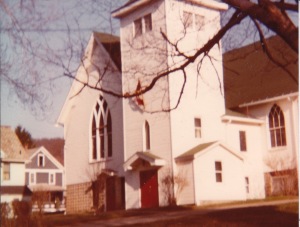Chief was a smart horse. The horse camp instructor told us that horses sometimes distended their midsections when a rider was strapping on the billet because they knew the strap would be tight. The billet goes underneath the horse and is essentially what holds the saddle on. The instructor told us to be firm about this—we weren’t going to hurt the horse by tightening the strap as much as possible. Now, this was United Methodist Church camp, and I am someone who tries hard not to hurt anyone. Besides, I’m not one of the larger specimens of the species and Chief was quite a large horse. I can swear he had a knowing, laughing look in his eye that day as I pulled the billet tight. Or so I thought.
As a camp counselor in the Western Pennsylvania Conference, you were assigned to a set of camps with no say in the matter, and I had been assigned four weeks of horse camp. I wasn’t a kid who grew up wanting to ride or own a pony. I was just doing my job. Sitting atop a horse, I felt like some combination of John Wesley and Edgar Allan Poe heading for the house of Usher. It was the first day of the first week of camp and my first time riding. It was going fine until the instructor told us to canter, the speed between a trot and a gallop. It was then that I felt the saddle starting to slip and I knew that Chief had used the old horse trick of distending his middle while I’d tightened the strap. I felt the saddle begin to slip to the right (the wrong side for mounting or dismounting). So I fell off a cantering horse.
Although the instructor yelled at me for not putting the reins over the pommel before I hit the ground, what stayed with me was how smart that horse was. Chief, knowing the disparity of our relative sizes and weights, once stepped on my foot. He was an intimidating horse with an attitude. After the end of four weeks I’d gone on to the point where we spent an overnight in tents with our horses curried and tethered outside for the night. What those days taught me was just how intelligent animals are. I was reassigned from Chief to a more gentle horse for the remaining three weeks when the instructor realized she was stuck with me for a while. But the horses, they knew me even better.













